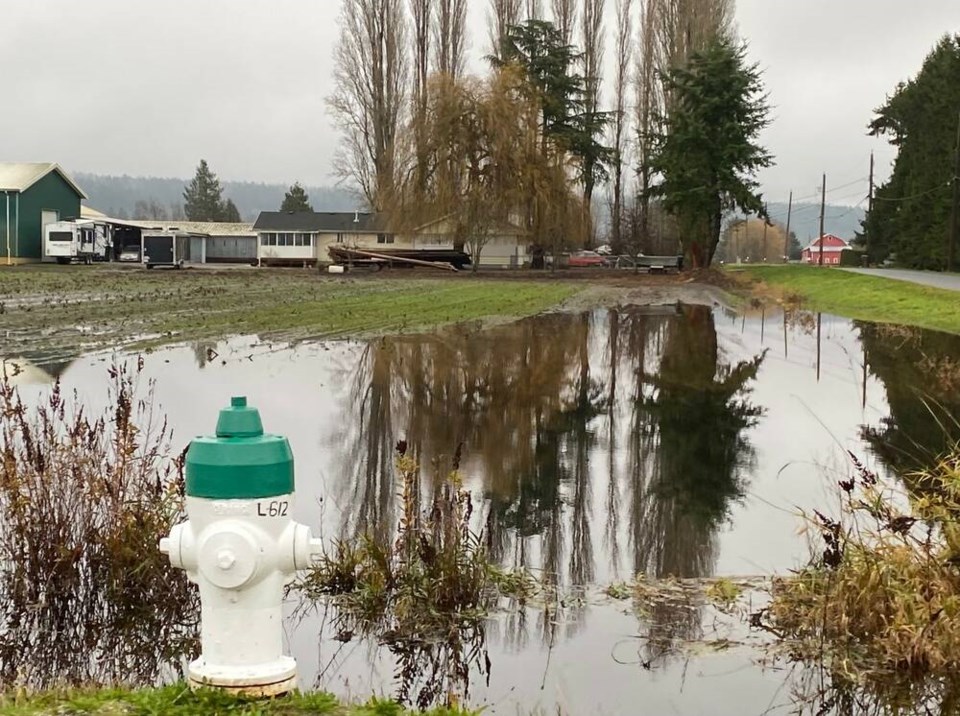Delta’s 30 drainage pump stations were all operating at capacity during last week’s storm event.
That’s according to the city’s engineering department, noting, in the future, there are plans to upgrade and construct new drainage pump stations in the East Ladner and Tilbury areas.
The current system ensures drainage of the floodplain lands by conveying storm flows to the Fraser River or the sea.
When the risk of flooding is lower in the summer months, the drainage system is also used as an irrigation storage system to help local farmers with crop production.
The City of Delta is hoping to secure federal dollars for a pair of drainage control projects that will costs big dollars to build.
The city this year submitted grant applications to the Disaster Mitigation and Adaptation Fund program for new pumps stations, the 84 Street Pump Station and the Silda Ditch.
Carrying a total estimated price tag of more than $19 million, the drainage control projects are aimed at further protecting low-lying areas.
Qualifying municipal projects will receive 40 per cent federal cost share funding, with projects to be completed by 2032.
An engineering department report notes that the 84th Street Pump Station is required to service the proposed Parkwood industrial development and minimize the risk of flooding in low lying agricultural lands south of Ladner Trunk Road.
The Ladner Trunk drainage area is comprised of approximately 1,200 hectares, stretching from Highway 99 south to Boundary Bay and between 72 Street and 96 Street.
A new pump station will not only help address long-term flooding concerns for the area and provide additional pumping capacity from the proposed industrial development, but also the Ministry of Transportation and Infrastructure’s Highway 99 widening project and clean stormwater runoff from closed cells of the Vancouver Landfill, the report explains.
To be built in phases, the project is currently in a detail design phase and staff are working with the province to acquire necessary environmental permits.
The Silda Ditch catchment area extends from River Road south to Burns Bog and from Cougar Creek westward to 96 Street.
That pump station is required to service the future MK Delta industrial development south of the Highway 91/17 interchange, as well as accommodate the increase in runoff from the completed Highway 91/17 interchange project. It will also alleviate long-term flooding concerns near Planet Ice.
In 2022, Delta retained a consultant to complete a preliminary design.
Meanwhile, the Delta Farmers’ Institute recently requested a meeting with the Minister of Agriculture and Food and the Minister of Land, Water and Resource Stewardship, as well as financial support, for drainage and irrigation infrastructure improvements necessary to combat the effects of climate change.
Another Delta staff report notes that while the community has some of the best biophysical conditions for agricultural production in Canada, climate change has emerged as a threat to the long-term viability of agriculture in the community.
That report also notes that during consultation with Delta’s agricultural sector as part of the city’s Agricultural Plan process, there was a high degree of concern over potential loss of agricultural land to flooding, changes in spring freshet, challenges in maintaining drainage ditches, impacts to crop viability due to excessive salinity in irrigation water and extreme heat, and erosion of ditches as water levels fluctuate.
The early freshet this year resulted in the Fraser River salt wedge extending up the river further than expected, which was then exasperated by drought, impacting irrigation through excess salinity and reduced water availability.
Significant costs were incurred to employ temporary measures, including installing pumps and deployment of city engineering staff, costs covered by the City of Delta



